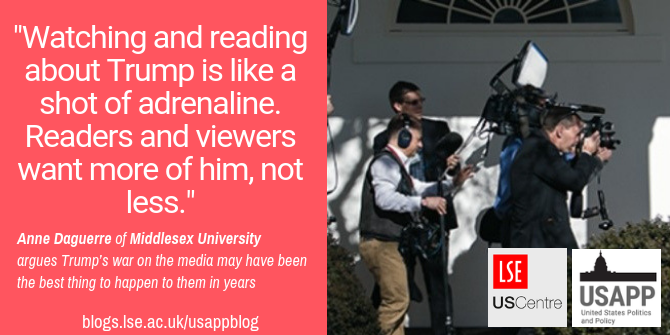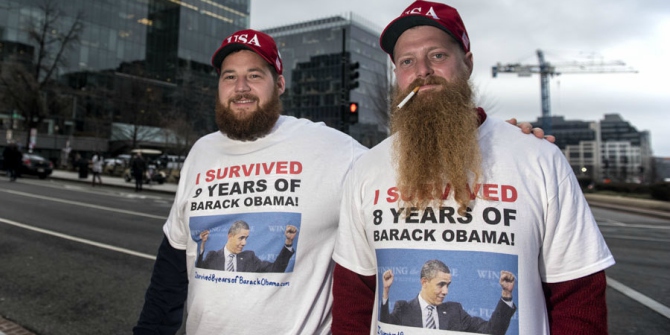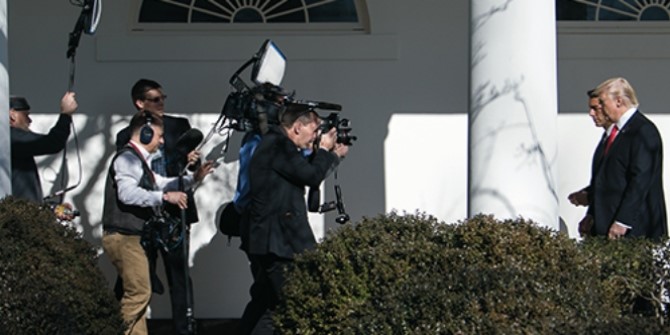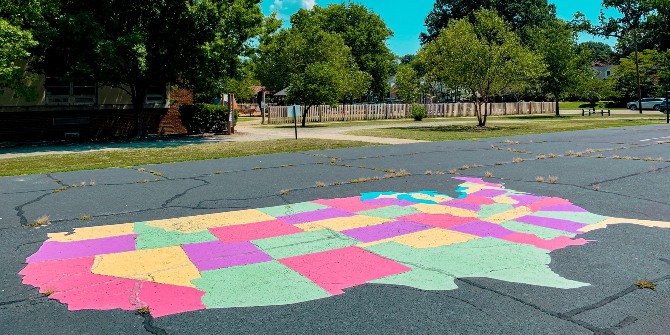 Since he became president – and during his election campaign – Donald Trump has positioned himself as being in direct opposition to the media, at times calling them the “enemies of the people”. Anne Daguerre argues that in contrast to the relatively placid Obama White House, the Trump administration’s seemingly never-ending supply of scandals and stories has actually been a boon for the media – and for their bottom lines.
Since he became president – and during his election campaign – Donald Trump has positioned himself as being in direct opposition to the media, at times calling them the “enemies of the people”. Anne Daguerre argues that in contrast to the relatively placid Obama White House, the Trump administration’s seemingly never-ending supply of scandals and stories has actually been a boon for the media – and for their bottom lines.
Should journalists say “Thank You, Mr. Trump”, as suggested by the president in a September 2018 press conference? As is often the case with Donald Trump, he has a point. Trump’s war on the liberal media is the best thing that has happened to American journalism in the early 21st century. CNN, MNSBC, the New York Times, and the Washington Post: all have enjoyed a Trump bump. In fact, the Trump presidency, with its endless collection of mob like stories and colourful scandals, has been a lifesaver for American TV networks, the printed press and the publishing industry.
JP Morgan has recently upgraded the Times shares’ rating from neutral to ‘overweight’ as it predicted strong growth in the next two years. Since 2016, the number of people watching CNN has grown from around 400,000 to 700,000 people, a 300,000 audience’s gain since the pre-Trump news cycle. 2018 promises to be the most profitable year for the channel.
Reporters and columnists, being usually centre-left, dislike populist politics. But populists make good headlines. And Donald Trump is the best story. Watching and reading about Trump is like a shot of adrenaline. Readers and viewers want more of him, not less. The result? US news, always self-centred at the best of times, is now saturated with Trump.
The contrast between the no-drama Obama White House, with its technocratic, Silicon Valley friendly rhetoric, and the Trump soap opera, rooted in white, 1950s America, could not be greater. But was the former administration particularly good for accountability? The Obama White House was in fact one of the most secretive in recent American history. In a 2013 report, Washington Post veteran journalist and editor Leonard Downie Jr described a “climate of fear” amongst Washington insiders. The Obama White House had a sophisticated PR media operation, producing content and distributing doctored information through social media.

“President Trump’s First 100 Days: 3” by The White House is Public Domain.
It was difficult to get substance from Obama officials. The former administration also cracked down on whistle-blowers and tried to oblige journalists to reveal their sources. Champion of civil rights attorney general Eric Holder did not hesitate to intimidate journalists. In May 2013, the Department of Justice seized two months of phone records for reporters of the Associated Press, interfering with the press’ constitutional rights to report the news. Of course, unlike Donald Trump, Barack Obama never called the press “the enemy of the people” or the “opposition party”. But where Donald Trump barked in front of the cameras, the Obama administration, just like the Bush administration, worked behind the scenes, effectively challenging press freedom.
There has been no proper assessment of the Obama administration’s legal actions against the press. This crucial part of the Obama legacy has been swept under the carpet. The reason? It does not fit with the narrative of an existential contrast between the enlightened Obama era and Trump’s age of darkness. And that narrative is essential to the commercial success of the pro and anti-Trump media camps. Which president is best for business, Obama or Trump? Well, there’s no suspense here: it’s the reality TV star that sells, not the constitutional law professor. It’s precisely because Donald Trump is so polarizing that the media have used him as a marketing tool.
There is something phony in the relationship between Trump and the American media. Each protagonist is working himself into a frenzy of moral indignation. The recent spat between Trump and CNN over reporter Jim Acosta’s White House press accreditation is a perfect illustration of this spectacular antagonism. However, behind the scenes, the relationship between CNN and the Trump administration is much less confrontational than publicly shown. CNN continues to have access to the White House.
And, if the antagonism between Donald Trump and the press needs to go up a notch, there’s nothing like a good old lawsuit to dramatize the battle between good and evil. America loves a courtroom drama. She will get a few in the next months.
If, as seems to be the case, the American presidency has been turned into a money making operation that benefits the Trump family, then the Trump White House stands in direct violation of the non-emoluments clause of the Constitution. Corruption charges look increasingly likely. Such investigations are going to overlap with the Mueller inquiry. Donald Trump is going to war, not just with the press, but with Democrats as well. This will make excellent copy and will keep viewers glued to their TV screens. The Trump bump will continue, at least for the year to come.
- A version of this article originally appeared on Medium.
Please read our comments policy before commenting.
Note: This article gives the views of the author, and not the position of USAPP– American Politics and Policy, nor of the London School of Economics.
Shortened URL for this post: https://bit.ly/2EuwE9S
About the author
 Anne Daguerre – Middlesex University
Anne Daguerre – Middlesex University
Anne Daguerre is an Associate Professor in Work Employment and Welfare at Middlesex University, London and an alumna of the Woodrow Wilson Center. A specialist in welfare reform, her current research compares the American and British safety net.






